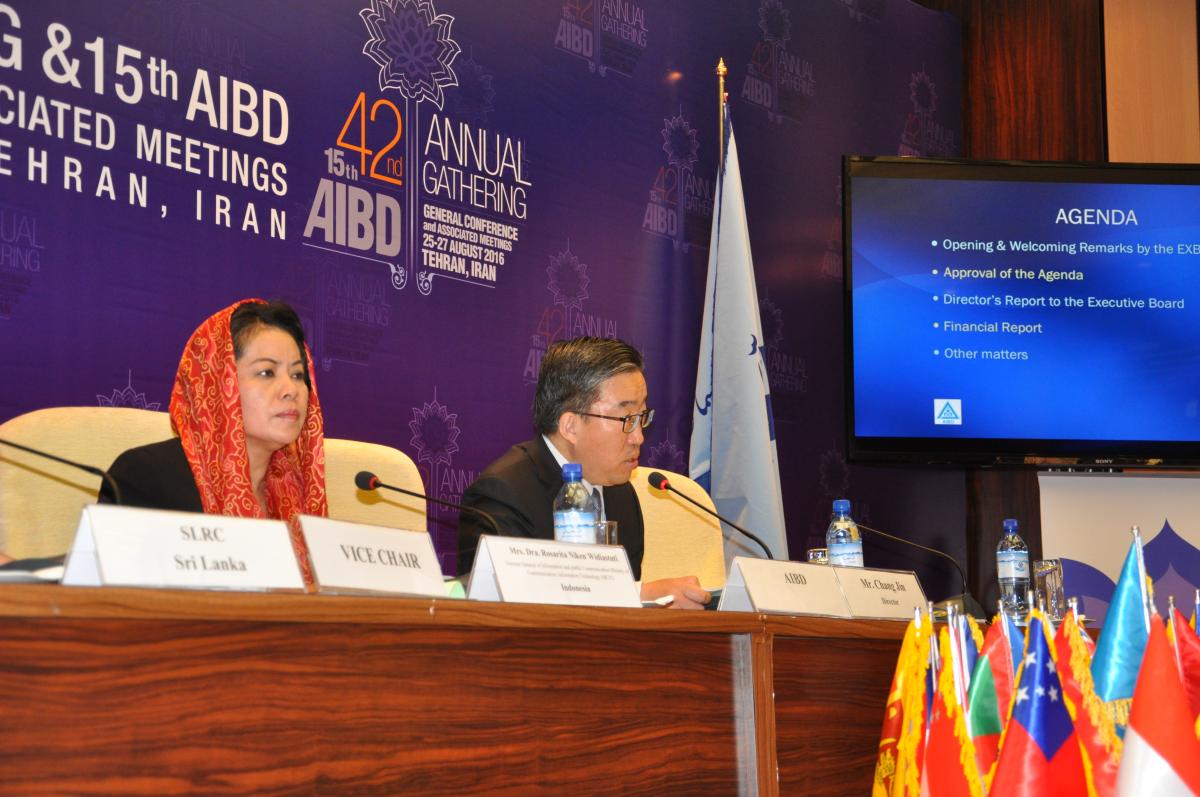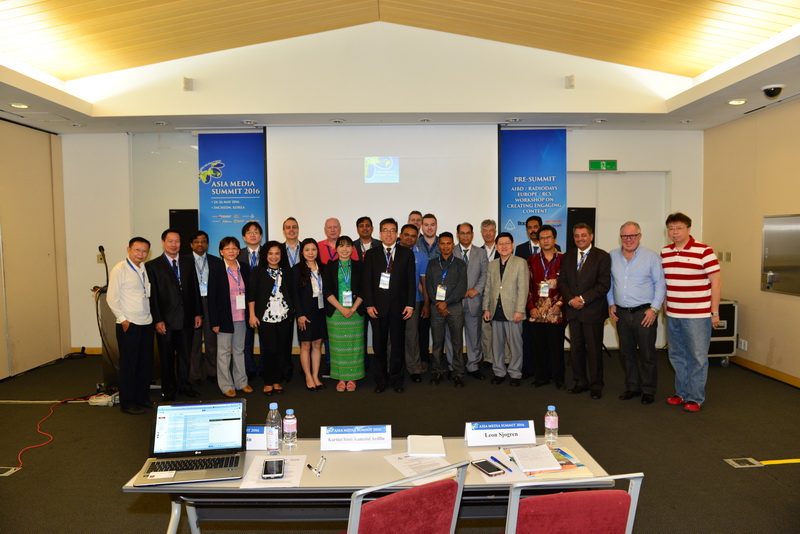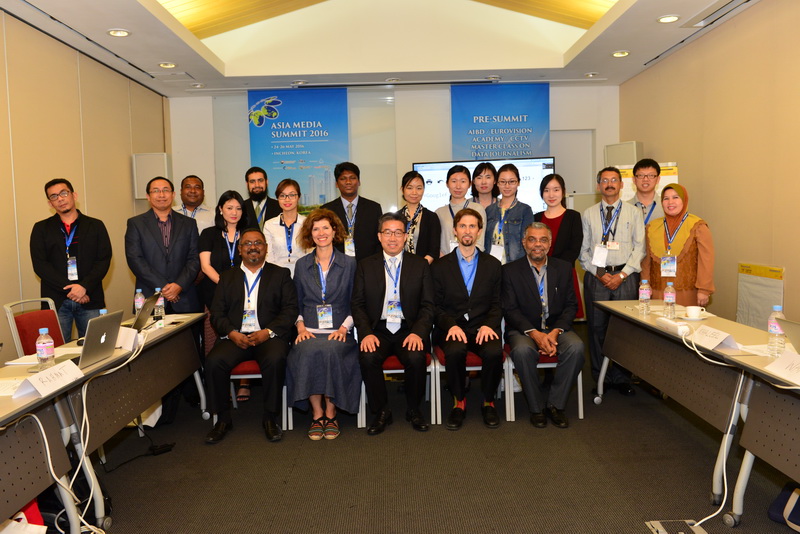By Mr Steve Ahern CEO International Media & Broadcasting Academy (IMBA), Australia

“I now know how to use smartphones in my work,” said a participant from Voice of Vietnam, describing the Shooting Video with Smart Phones workshop in Kuala Lumpur organised by the Tun Abdul Razak Broadcasting and Information Institute (IPPTAR) and AIBD from 19 to 21 September 2016.
Workshop participants from seven Asian countries learnt about the new tools of reporting and gained skills for shooting video with smart phones.
The workshop aimed to impart participants with skills in shooting, editing and filing video using smart phone and tablet technology, plus appropriate native and third party apps.
“This is the proof that we can use smart phones to make live newsroom content,” commented a reporter from RTM Malaysia, after completing the final exercise, where the team shot, edited and filed all their content for a live program via their smart phones.
“This is something great that I have learnt. This technology is replacing the conventional broadcast technology for location reporting… this is the best technology to use,”said an experienced cameraman who participated in the workshop.
“I’m not very friendly with IT, but this is the first time I have been able to edit in smart phones… I want to give this course five stars,”said a workshop participant from Malaysia.

At the end of the workshop the participants understood the latest developments in new and social media and applied their understanding to gathering and sharing location video using smart mobile devices.
Because of changing audience consumption habits it is more important than ever for reporters to be equipped with tools that allow them to file from any situation quickly and to as many output channels as possible, including social media. The course equipped them with those skills.
Participants were taught a range of mobile smart device video tools, including mobile apps, social media interfaces and social media monitoring tools, learnt the methods of filing their video reports using the latest mobile technology.

Workshop leader Steve Ahern said the participants learnt quickly because, “we use many of these skills in our personal lives for posting pictures and videos of our kids and our cats on Facebook. It is just a matter of teaching participants how to transfer those amateur skills to their professional work.”
“Once you experiment with free apps and find the best ones, you should invest in the ones that are most effective… it was much more difficult than I thought,”said Malaysian participants in the final live report from the workshop
Footage created by participants can be seen on the link: https://www.youtube.com/watch?v=L-Og6mbS_NU
AIBD/IPPTAR Regional Workshop on Shooting Video with a Smartphone
By Mr Steve Ahern CEO International Media & Broadcasting Academy
Regional workshop on DVB T2 Transmission
The Regional workshop on DVB T2 Transmission was held in Kunming, Yunnan Province, China from 16 to 18 August 2016. The workshop was designed for the technical staff of television stations who are working in transmission division. The workshop was hosted by Yunnan broadcast bureau of the State Administration of Press, Publication, Radio, Film and Television (SAPPRFT).
AIBD Implements 33 Training Workshops in 2015-16
AIBD undertook 33 training workshops covering mostly areas dealing with TV and radio production, children’s programmes, disaster risk reduction and new media from 1 July 2015 to 30 June 2016.
Close to 700 broadcasters from Asia-Pacific benefitted from these in-country, sub-regional and regional activities.
In-Country workshop on HDTV Lighting
The In-Country workshop on HDTV Lighting was held in Bandar Seri Begawan, Brunei Darussalam from 9 to 14 May 2016. The workshop was designed for the programme and technical staff of Radio and Television Brunei (RTB).
ASBU’s Commits Support to AIBD Activities
The Arab State Broadcasting Union (ASBU) announced it will continue to support the Asia Media Summit, 2017, the World Television Awards and pledged more Arab participation in the AMS 2017 to be held in May in Qingdao, Shandong Province, China.
Ms Moufida Limam, Chief, of the ASBU Director-General’s Office, Tunisia, made the commitment on 25 May 2016 during the 12th AIBD/ASBU/ABU Media Partnership Committee Meeting that took place during the Asia Media Summit in Incheon, Korea.
Making the Most of Radio Content
Radio stations in developing countries are missing opportunities in making their content live after they’ve broadcast it. They must learn to broaden their audience “by making the most of their content - getting more listeners, more revenues and more exposure for their brand.” Mr. James Cridland, a Radio Futurologist from the UK, gave this advice to broadcasters who participated in the presummit Workshop on ‘Creating Engaging Radio Content’ held Monday in Incheon, South Korea.
New Ways to Tell Compelling Stories through Data Journalism
News organisations across the globe are increasingly using data journalism to find new and compelling ways of telling stories with numbers and infographics, and make people more engaged with information. “Data journalism is making the journalism field more exciting and vibrant,” Mr Kevin Anderson, Faculty member of EBU’s Eurovision Training Academy, told participants of the AIBD/Eurovision/CCTV Master Class on Data Journalism held Monday in Incheon, South Korea.
Steps for a Successful Social Media Community
Setting goals, creating realistic plans and strategies, defining the audience and platform to use to meet your objectives, and determining how to measure results are critical requirements for success in creating a vibrant social media community.
“ You cannot engage effectively in social media without these steps; otherwise your efforts will lead to failure,” said Mr. Benjamin Dalmulder,, Team Manager for Digital Analytics and Search Engine Optimisation, and Ms Katarina Gomes, digital strategist, both of RNW Netherlands, during the regional Workshop on Online and Social Media Analytics held Monday in Incheon, South Korea. Both served as consultant for the project organised by AIBD and supported by RNW, Netherlands.
Popularising Drones for News and Dramas
The use of drones or unmanned aerial vehicles (UAV) is increasingly becoming popular for content production on various media platforms. Drones have changed the ‘shooting environments’ in news and drama production, enriching content and viewers’ satisfaction. More broadcast stations are also beefing up their in-house capabilities for drone services.
These are some of the trends in content production that Mr James Ku, President of James Company Ltd,. Korea, highlighted in his presentation Monday during the workshop on ‘Using Drones for Production; A New Wave in Broadcast Content Production,” one of the five –pre-summit events leading to the Asia Media Summit to be held tomorrow in Inchon, Korea.







